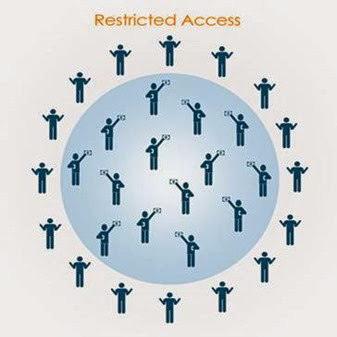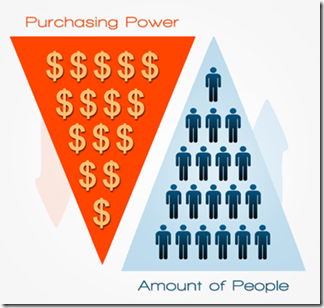This blog-post is a response to a Facebook Comment made in relation to the Living Income Proposal.
 "Government
is still government. Centrally coerced power nonetheless."
"Government
is still government. Centrally coerced power nonetheless."
I suggest reading the blog ‘How Companies will be Nationalized and What
does it Mean? LIG’ for more clarity on how we suggest
nationalization is to occur – where it is NOT the government that would
centrally own/control the resources ‘on behalf of the people’ – it would be the
every citizen directly being a shareholder of the nationalized companies. This
means that the companies will not be used in favor of the government – but in
benefit of the population as a whole. Herein, no changes really have to occur
in how the companies are operated today, the only difference is where the
profit goes and who takes part in shareholder meetings.
" "If we define competition as the ability achieve the best living
condition in a society " has absolutely NOTHING to do with competition within a free
market sense. Such fundamental misrepresentations / rebranding of words is
disservice."
Competition for the sake of
competing/winning is a disservice to society as a whole. This is what the
‘invisible hand’ doctrine is all about – that self-interested competitive
behavior yields result that are favorable to others in society, which was not
intended. However, currently this competition has, let’s say, ‘evolved’ to the
point where the ‘losers’ in the competition literally lose everything –
including those things that are supposed to be guaranteed human rights. This is
where LIG intends to make a difference. Competition is useful from the
perspective that it creates an environment where participants strive to create
the best product and the best service – which in turn enhances the quality of
life of the members of society (which is what is referred to in the quote you
mentioned) but it shouldn't do so at the expense of an individual’s ability to
provide themselves with living necessities.
"None of these terms mean anything. "Activation of the economy"?"
Simply referring to
increasing economic activity, employment and productivity.
Who knows what standards they employ for not interfering with the "nationalization of natural resources". How do you qualify
"interfere with public services"? Who the hell even determines what is objectively
the "highest quality"? This is complete monopoly of resources, enstated through force / coercion
/ compulsion, with extremely ill-defined definitions of language. This is
one step away from having a dictator.
You’re using
quite a slippery-slope type
of argumentation here – it would be a good example of ‘how not to do it’
in
critical reasoning courses. Anyhow – monopoly of resources: no – it
would be
quite the opposite – resources would be owned by every citizen of a
country and
would no longer be able to be controlled by a few. Remember – it is not
government that owns the resources, it is the citizens directly. Also –
it’s
not that we are suggesting to have only one company provide for instance
electricity and that this company should be nationalized and that this
company will now receive funds from the government that other companies
don't - No – we encourage healthy
competition between firms supplying the same/similar services – whether
these
are ‘nationalized’ firms (in the sense that is discussed in the Living
Income
Proposal) or whether they remain in private hands.
A
HUGE issue with this program, besides the mind-blowing idiocy in their
understanding of basic economic concepts, is the perversion of price. I
guarantee you if you linked a good description on how they intend to
replace the price mechanism I'll blow it away in a second. Not even
Zeitgeisters' resource-based economy can figure this out.
You know how monopolies are kept in check in a FREE MARKET?
Companies A,
B, C, D. A uses profits / loans to buy companies B. Company C raises the
price
of his business since he knows that company A is trying to corner the
market. If Company A tries to buy D he either already used so much of
his $$$ or took
on so much debt than company D can simply hold on and corner the market
himself.
Self-interest and FREE markets naturally limit these things. It is self-regulating.
How
about collusion? A, B, C, and D form a union and agree to raise prices
across the board. Guess what? The first company who defects from the
pact
and drops his prices gets the WHOLE market share. In return the other 3
companies HAVE to lower their prices as well.
Probably have never heard that in your entire life.
Please – I suggest you get your head out
of your economy-books and rather do some real-life investigation. How can
Nestle, for instance, have 12% of the WOLRD market if the free market is so
self-regulating? Theory and practice are not the same thing. The free market is
inherently not designed to take into account, for instance, living conditions –
as you probably know – equilibrium wages have nothing to do with living wages –
yet, how can we allow companies to set prices that adhere to market-principles,
when it means they cannot pay their employees a proper wage? With LIG we suggest to make minor adjustments so that at the very
least, everyone’s human rights are guaranteed and so that any worker is
actually recognized as someone who participates in providing their labor for
the benefit of society through producing goods and services, through a wage
double the living income.
You require to
consider that ‘pure’ free market principles are nothing more than a
nicely
formulated set of justifications the elite uses to continue abuse in the
market. So, I suggest supplementing your studies with independent
research, so that you can come to grips with what is really happening
and how it doesn't match the economic theories.
It's a big ol lie that the government "protects" you from
monopolies and collusion. They kill the competition and FORM the
monopolies. Governments
take out the risk of monopoly by taking AWAY the risk. Ever hear of bank
bailouts? Privitized profits and socialized losses? They only got that
big anyways
because of the government. The problem isn't banking. It's the coercive
nature of government which traps people (under the point of a gun) to
this fraud.
Again – we propose a very limited role
for government with Living Income Guaranteed and suggest that as much as
possible is done automatically to minimize the possibility of fraud and
inefficiency.
Bureau
of Standards? I mean the hell, it is not economically efficient of
ideal to produce everything to the "highest-standard" possible. Should
a lead pencil be made from Brazillian hardwood? Would wooden pallets for
shipping all be required to be made from hardwood to withstand maximum
weight load? Would
we even have the existence of goods such as particle board / press wood /
mulch (after all ALL of these were reinventions of waste products which
had no productive use before...... but according to this theory we
should have
not have even cut the lumber before we planned what to do with the
chips). You put
this policy in place 100's of years ago and we'd have no such thing as
cheese
or whey protein because damn........ once you make the cheese we'd have
to employ
100 researchers to find out what to do with the whey! Guess no cheese
until we figure out the "perfect plan" eh?
Here you’ve taken words out of context. With
the Bureau of Standards the intention is to go back to good-quality products.
Of course, there is no purpose for a pencil to be made from Brazilian hardwood.
But there is a purpose for a microwave to last for 50 years instead of 5. So –
we’re here looking specifically at equipment/tools that are not actually
consumer-goods in the sense of, for instance, food that is consumed – where you
buy it, you consume it, now it’s gone and you have to buy more.
Equipments/tools were originally designed/meant to last a long time, but as it was
realized that if you make something to break – people have to come buy a new
one – inferior materials started being used and tools/equipment started
becoming consumer products in that you use it only x times/ for an x amount of
time and now it’s broke and you have to buy a new one. Such behavior creates
consequences not only for the current but for future generations as well, as it
perpetuates a wasting of resources. So, the Bureau of Standards is a
suggestion to ensure we do not waste resources on inferior products. This is
something the free market does not regulate, because it is an external cost.
Yet, it is absolutely important that we start pacing our rate of production to
the physical if we want to keep living on this planet. It is not, however, a
means for central planning. In the same way we have regulations for safe
food-production – there should be a Bureau of Standards for quality
tools/equipment because it is in everyone’s best interest.
The understanding of the fundamentals are completely whack. Even if you
cut past this hogwash it ultimately is just coercive force / violence by the state
put into extreme, pretty much Soviet Russia or Communist China.
Centrally-planned, coerced ideals through "objective calculations" that seem good
on paper but starve millions due to misallocation of resources.
Not really worth any more of my time. All of the 10+ pages from this
program have been utterly shameful. If it wasn't for the fact that stupid people
can "democratically" vote and enslave the rest of us under this type
of tyranny I wouldn't even bother.
I suggest taking a breath – letting go of
your fears, and with the perspectives given in this blog – read the proposal
again – so that you may see it for what it is, rather than filter it through
your mind – as you’re currently making associations and interpretations that
are in no way part of the LIG proposal.
For context and more information:
Living Income Guaranteed - the Proposal: http://livingincomeguaranteed.wordpress.com/the-proposal/
Living Income Guaranteed YouTube Channel - watch the hangouts: https://www.youtube.com/user/BIGuaranteed?feature=watch
Living Income Guaranteed Website: http://livingincome.me












































